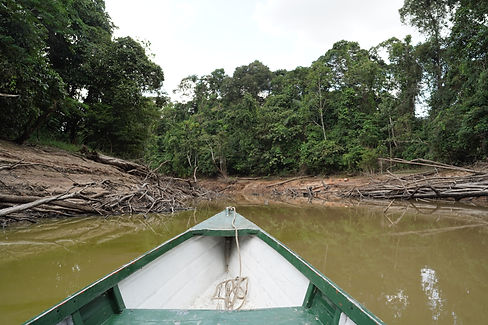ETHNOGRAPHER | INDIGENOUS RIGHTS INVESTIGATOR | EXPLORER
Fieldwork research with the Maijuna people of Sucusari, Peru
On the Road to Desolation
The Maijuna people have lived in this part of the Amazon since times immemorial. Like many Indigenous communities in the Amazon, the Maijuna lived through violent persecutions by outsiders who attempted to strip them from their culture, language, and traditions. “Taming the uncivilised” to distantiate local communities from their roots was one of the first steps to enslave an otherwise self-reliant people in a colonial scheme of patrón-tenant relationship that sought to devour their natural resources to fuel the economic development of distant lands. The Maijuna may have broken free from this scheme of subordination, but their lands continued to be encroached. Today, a binational mega-development highway project is underway, which will pierce through their titled ancestral lands.

Sebastián Rios Ochoa, a Maijuna elder, during one of his favourite early morning activities: fishing.
It’s hot and humid under the dense canopy and I run to keep pace with Agapo, my living compass out of the jungle. Using only the landscape as reference points, he navigates the forest without hesitation or fear of getting lost. He swings his machete with effortless agility, moving through the dense forest with a grace born of a lifetime in the wilderness.
Along the way, Agapo makes a few stops and tells me every single story he could remember, while I, as an ethnographer, registered them in as much detail as the circumstances allowed. But the documentation of his knowledge went beyond any thirst for anthropological enquiry. Rather, I felt that there was an understood expectation from his part that I would do so.
It seemed as if he recited these stories just so he wouldn’t forget about them. At the same time, his willingness to share his teachings seemed to emerge from a conscious realisation about the importance of safeguarding his repertoire of traditional knowledge for the next generations.


We continued walking for another hour. The hum of the forest dimmed with each step, until Agapo stopped in a strange clearing that contrasted with the surrounding forest. It was an old 5-meter wide path that had been carved by rubber tappers who used the trail to transport rubber and other commodities on horses.
Later, Agapo tells me, it was re-used by narco-traffickers who transported cocaine into the country from Colombia. Today, this almost overgrown path is marked as one of the trails that will be converted into the Iquitos-Colombia highway and it’s perverse 10-km-wide ‘development initiative’.
After a long period of silence, Agapo, who stood still in the middle of the clearing, recounted a time when he and his father would hunt together in the area. The feeling of nostalgia in his voice was clear, as it was his pain and anxiety about the future of his people.
The many Amazonian communities who lost their ancestral lands to projects that promised to serve them are now found in marginalised areas of small towns, disintegrated from their roots and traditions as they try to scratch a living from a cash-based economy that keeps them firmly at the bottom.

Our way back to the camp was oddly a silent one. Agapo, who walked at a fast pace, did not look back as I got entangled in the dense vegetation and buried knee-deep in the mud. He seemed haunted by the past and worried about the future.
Agapo, like the handful of Maijuna elders that champion this resistance, have witnessed the crying of the forest their entire lives, and they understand fully well that the fight to protect their ancestral lands will not end with stopping this road.


"We don’t know if we can win the fight against the State. The government has a lot of money and they can do whatever they want, while we barely have the resources to mobilise our communities. What else can we do?”
— Agapo Ríos Torres, Maijuna elder
History has taught the Maijuna that the riches that lie under the pulsating heart of Amazonia will continue to be sought after. For these reasons, the Maijuna elders fear for the next generations who must carry the torch of their people in their hearts and souls as they delve into an unpredictable future.


Today, the ancestral forests that ensures the physical and cultural survival of the Maijuna people are threatened, but the community is bound to protect it with everything they have, even if that means adapting to a bureaucractic game they never wanted to play.

“My sons and grandsons are following my footsteps and are learning how to best protect our forests. When it’s their time, they will be the ones standing up to safeguard the Maijuna lands. But now this is our time, to lead this fight by example and set a precedent for the future.”
— Agapo Ríos Torres, Maijuna elder